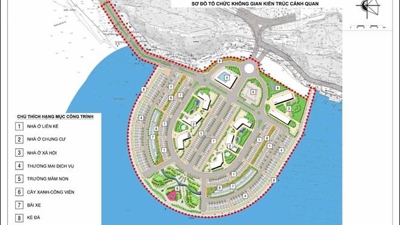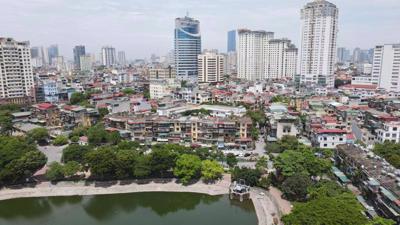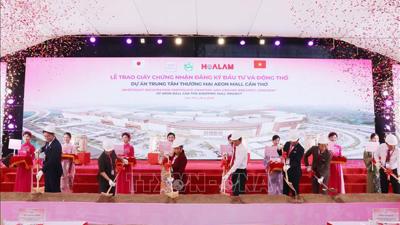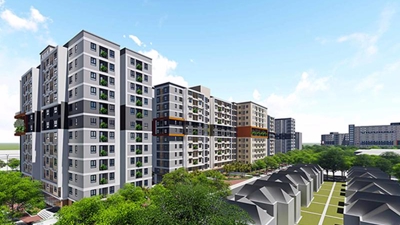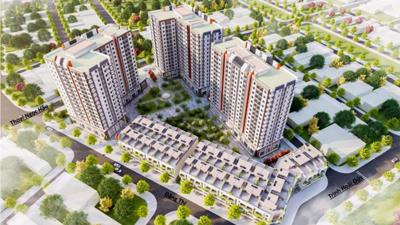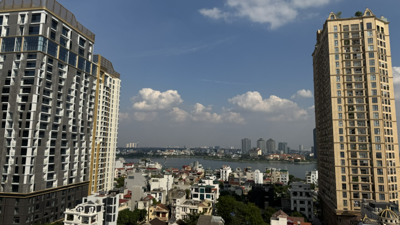Vietnam boasts competitive advantages in elderly care real estate
Together with international retirees, elderly Vietnamese and overseas Vietnamese looking to return to their homeland upon retirement constitute a growing market for elderly care real estate offerings in the country.
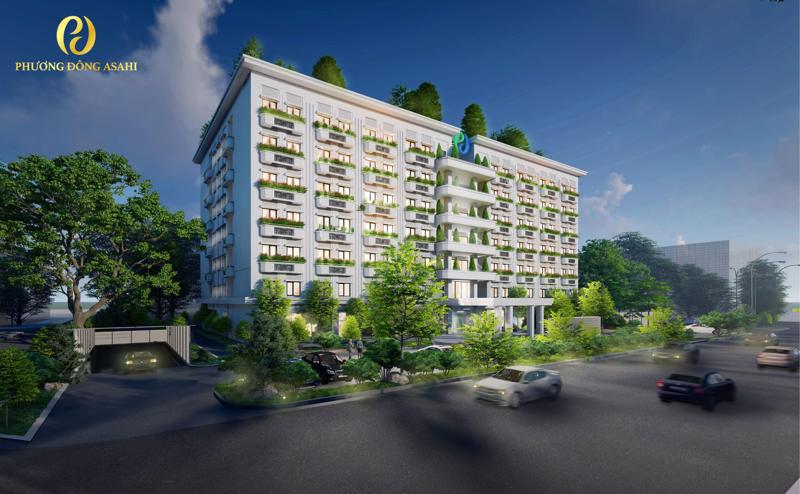
Experts have highlighted Vietnam’s distinct competitive edge in resort - elderly care real estate compared to elsewhere, from its picturesque natural landscapes and rich cultural heritage to its cost-effectiveness. The sector’s vigorous growth not only appeals to affluent elderly Vietnamese and international tourists but also attracts significant remittances from around 6 million overseas Vietnamese.
The country’s healthcare industry is vast, encompassing medical services, healthcare, wellness tourism, and elderly care. Wellness real estate products not only enhance people’s mental well-being but also promote environmental sustainability, and the sector boasts numerous successful models around the world.
Comprehensive healthcare environment
Situated on a 10-ha site within the Phuong Dong Medical Complex at 9 Pho Vien, Co Nhue 2, Bac Tu Liem district, in Hanoi, the Phuong Dong Asahi Nursing Home spans 7,000 sq m, featuring seven floors and two basement levels.
In particular, Basement Floor 1 offers a premium relaxation area with a Japanese-standard Onsen, steam baths, a spa, and therapeutic massage services. The first floor includes a variety of amenities: a distinctive Asahi restaurant showcasing the culinary excellence of Asia and Europe, a four-season swimming pool, and a modern gym. The second floor is designated for outpatient services and physiotherapy and rehabilitation rooms. Floors three to seven, meanwhile, house the inpatient care area with 175 diverse rooms, including deluxe single-bed, double-bed, and four-bed rooms, family rooms accommodating up to ten people, and premium apartments. These spaces are designed with elegance and luxury in mind, seamlessly blending modern and neoclassical styles with high-end interiors. The rooftop boasts the lush green space of the Truong Xuan Japanese Garden and the Phuong Dong Park, uniquely designed with meticulous attention to detail in every stone, tree, and shrub.
Notably, 18 VIP and President apartments on the seventh floor, each measuring up to 64 sq m, come with luxurious living rooms and convenient kitchen areas, making them perfect for warm family gatherings. Residents on the seven floor can also enjoy 24/7 healthcare services with a private butler and special medical treatments.
Not only offering a comfortable living environment, Phuong Dong Asahi Nursing Home also emphasizes building a close-knit community, and provides enriching recreational activities that inspire both physical and mental well-being, including sports clubs, talent clubs, painting, poetry, and more.
Residents’ health and mental well-being are continuously monitored and updated by a team of experienced doctors, nutritionists, and nurses to promptly detect and address any health issues, ensuring the highest quality of life. This distinct feature differentiates it from conventional nursing homes.
“Recognizing the importance of health and mental well-being for the elderly, Phuong Dong Asahi Nursing Home introduces a ‘Hospital within a hospital’ model with a unique and professional medical care system that is unprecedented in Vietnam,” said Mr. Nguyen Cong Minh, General Director of the Phuong Dong Medical Complex Co., Ltd. “Fully benefiting from the modern facilities and advanced equipment of Phuong Dong General Hospital, Phuong Dong Asahi meets all the medical examination, treatment, and healthcare needs of its residents.”
“Phuong Dong Asahi Nursing Home begins with an initial health assessment conducted by a team of highly specialized doctors using modern equipment, providing a customized care plan for each resident,” he continued. “The nutrition plans are individually tailored to ensure a balanced and nutrient-rich diet, combined with detox support, helping the elderly remain healthy and revitalized.”
“The rapid aging of the population and the increasing number of elderly individuals are creating both opportunities and challenges for Vietnam,” according to a representative from the Vietnam Real Estate Association in discussing the development of private luxury retirement - resort complexes like Phuong Dong Asahi Nursing Home. “Developing retirement properties addresses these challenges effectively and opens up numerous economic and social development opportunities. In addition to State-run healthcare facilities, private services that offer space, infrastructure, and amenities aligned with the ‘luxury’ retirement-resort trend comprehensively meet the needs of the elderly and have significant growth potential as Vietnam’s middle class continues to expand.”
Diverse domestic and international clientele
Thailand leads in health tourism in Asia, hosting numerous brands that offer wellness, resort, therapy, spa, and yoga services. Bali in Indonesia is also a popular destination due to its focus on spiritual well-being. With its rich natural resources, Vietnam is gradually emerging as a “highlight” in the development of wellness and retirement real estate.
According to real estate consultants Savills, with Vietnam’s tourism development policies and advantages, the country welcomes a large number of international tourists. This group represents a significant market of potential for wellness real estate, especially in Vietnam’s healthcare segment. Many retirees worldwide are seeking vacation spots with suitable healthcare systems. They are likely to be attracted to destinations like Da Nang, Phu Quoc Island, or areas near golf courses and sports centers. In fact, Vietnam already has a significant international clientele from South Korea, Japan, and other countries.
Additionally, a large number of overseas Vietnamese are eager to return to their homeland to live and enjoy their retirement years. This group constitutes an important customer base for wellness and retirement real estate projects in Vietnam’s major cities.
For the domestic market, the main factors influencing this segment include urbanization, lifestyle changes, and family structure changes. People’s perceptions of retirement homes have also evolved. Moving parents to a retirement home does not mean that their children do not love them. Nowadays, parents also wish to live in communities with peers to share their joys and sorrows, with doctors and nurses available for daily health monitoring.
There has been a noticeable upwards trend in the average life expectancy of Vietnamese citizens. As outlined in the “Population Ageing and Older Persons in Vietnam” publication from the General Statistics Office, Vietnam is experiencing one of the swiftest rates of population aging globally.
Based on national demographic data, the current count of elderly individuals in Vietnam stands at approximately 16.1 million, constituting over 16 per cent of the total population. Projections indicate that, by 2029, this figure will rise to 17.28 million (equivalent to 16.5 per cent of the population) and by 2038 will stand at 22.29 million (20.21 per cent) and by 2069 28.61 million (27.11 per cent). Numerous elderly individuals encounter challenges in their daily lives, including impairments related to vision, hearing, mobility, memory, concentration, and communication.
“This demographic shift underscores an escalating demand for elderly healthcare services,” said Mr. Matthew Powell, Director of Savills Hanoi. “Their requirements span a wide spectrum, from specialized facilities catering to health-related changes to round-the-clock care services for those dealing with mental or physical issues. While they may not necessitate hospitalization, they still require environments with tailored attention, amenities, and support services. This also underscores the significant potential for the development of eldercare real estate in Vietnam.”
Indeed, in recent times, alongside the limited government-run elderly care facilities, numerous private entities have become involved in the development of such real estate ventures. Examples include establishments like Thien Duc Nursing Home, Lotus Care, and Tuan Minh Paradise Resort.
There has also been an influx of brands offering resort hotel projects coupled with healthcare services, such as the Fusion and Six Senses. Several prominent domestic investors like Sun Group and Ecopark have also ventured into creating residential projects with diverse amenities, including healthcare services, targeting individuals nearing retirement age.
Nonetheless, there are widespread beliefs that a void remains within Vietnam’s resort real estate market focusing on elderly care. This segment remains underserved and inadequately addressed. The number of well-planned and invested resort - elderly care projects remains notably limited.
“This industry demands specialized attention, necessitating unique products tailored to meet customer needs,” said Ms. Hong Dao, a Vietnamese expatriate. “In particular, as foreign visitors, including the elderly, increasingly choose Vietnam, and many elderly expatriates express a desire to return to their homeland, the emphasis on healthcare services within resort - elderly care projects must be paramount with clear strategic planning. Ideally, these projects should be located in close proximity to hospitals, facilitating convenient access to medical examinations and treatment.”


